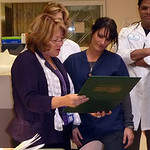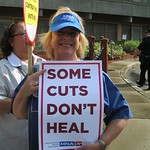
Rhonda Sgro, RN (right) receiving the “Daisy Award” for extraordinary nurses.
By Rhonda Sgro, RN
Published: August 28, 2013 in the Fresno Bee
The Rim Fire above Yosemite is hitting very close to home for me and my family, even though we live in Clovis. I am an emergency room registered nurse and my husband is a firefighter.
As a trauma nurse, I see the deadly impacts that fire and smoke can have on our community’s health: children with asthma that turns life threatening, the elderly with emphysema gasping for a breath, homeowners trying to protect their property left with second- and third-degree burns.
My husband, a Fresno firefighter, has now spent almost two weeks alongside his fellow heroes fighting on the front line of this catastrophe, risking his life daily. Over the past six weeks of solid firefighting, the last two on the Rim fire, he has been home twice for 12 hours each.
We both enjoy our jobs immensely and find the work very rewarding, but I have to say it was quite disturbing to read in The Bee that congressional “austerity” measures have left the Forest Service under budgeted.
Forest fires are getting worse. Global warming, development and changing forest management practices all have led to an increase in the size of wildfires since 2000, according to The Washington Post. At the same time, the Forest Service has less equipment and 500 fewer firefighters this year, reducing its force to 10,000, with 40 wildfires burning throughout the West. July’s Yarnell Hill fire in Arizona, which killed 19 firefighters, was the greatest loss of firefighters since the 1930s.
Austerity is a flawed economic philosophy, according to more and more respected economists. It is making things worse, not better, in every part of the globe, and now we are seeing its impact in our backyard as we watch a national treasure go up in smoke.
This shortfall is a direct result of the “sequestration” law passed by Congress and signed by President Obama. Every time our government makes an economic or political decision, it also poses this question: Who will live, who will get sick, and who will die?
Austerity and sequestration affect the health and safety of each and every one of us in some way — if not now, then in the very near future. A few examples:
In addition to the cuts in funding for firefighter positions, state and local emergency responders would lose funding, hampering our ability to respond to natural disasters like Hurricane Sandy.
Care for up to 373,000 seriously mentally ill adults and children may be eliminated.
The National Institutes of Health would be forced to delay or end vital scientific development of more effective treatments for chronic diseases affecting millions of Americans.
Food safety inspections will be cut, increasing the number and severity of safety incidents, and the public could suffer more food-borne illness, such as the salmonella in peanut butter outbreak and the E. coli illnesses linked to organic spinach.
Senior meals would be cut by 4 million. These meals are critical to the survival of participating seniors, including those with chronic illnesses that are affected by diet, such as diabetes and heart disease, and frail seniors who are homebound.
The meals can account for 50% or more of daily food for the majority of home-delivery participants.
Slashing 1,200 workplace safety inspectors who oversee some of the nation’s most dangerous jobs would leave workers unprotected and could lead to an increase in on-the-job fatality and injury rates.
Some in the House of Representatives now are threatening to shut down the government to defund the Affordable Care Act or “Obamacare.” As someone who spends her days trying to save lives and the wife of a man doing the same, I would like to send a clear message to these officials: Wake up and smell the smoke!
Rhonda Sgro is a registered nurse who works in the emergency room at Kaiser Permanente Fresno.
###


